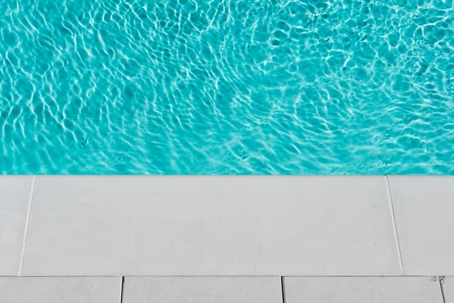Proper pool water chemistry is essential for a safe, enjoyable, and healthy swimming experience. Improperly balanced water can lead to a host of problems for your health as well as equipment and your pool.
Pool Water Chemistry Safety Tips
Some safety tips to keep in mind when it comes to pool water chemistry include the following:
You should take steps to safely store and handle pool chemicals:
- Read labels carefully. Always follow the manufacturer's instructions.
- Store chemicals properly. Keep chemicals in a cool, dry, well-ventilated area, away from children and pets.
- Use original containers. While you may want to rehouse chemicals in personal containers, you should leave store chemicals in their original, labeled containers.
- Avoid mixing chemicals. Never mix different pool chemicals together.
- Add chemicals to water, not water to chemicals. This can cause a dangerous reaction.
Pool water chemistry safety also involves completing the following pool maintenance:
- Test water regularly. Maintain proper pH, alkalinity, and chlorine levels.
- Use accurate measuring devices. Use calibrated measuring tools for chemicals.
- Add chemicals slowly: Distribute chemicals evenly in the pool to prevent hotspots.
- Shower before swimming: Remove body oils and lotions that can react with pool chemicals.
- Avoid swimming during chemical treatment: Wait the recommended time after adding chemicals before entering the pool.
Some general safety tips include:
- Ensure good ventilation when handling chemicals.
- Wear gloves and goggles when handling chemicals.
- Have a first aid kit and emergency contact information readily available.
- Secure pool chemicals and equipment out of reach of children.
- Consult a pool professional for complex water chemistry issues.
By understanding and maintaining proper chemical levels, you not only protect swimmers from potential health risks but also prolong the life of your pool and its equipment. Safe handling and storage of pool chemicals are equally important to prevent accidents and injuries.
Key Water Parameters
A well-balanced pool has adequate levels of the following:
- Chlorine, which serves as the primary disinfectant that kills bacteria and algae.
- Types: Chlorine comes in various forms, including liquid chlorine, chlorine tablets, and stabilized chlorine.
- Levels: The ideal chlorine level is typically between 1 and 3 ppm (parts per million).
- pH, which measures the acidity or alkalinity of the water.
- Ideal range: Between 7.4 and 7.6.
- Importance: Affects chlorine efficiency, skin and eye irritation, and equipment life.
- Alkalinity, which works to buffer pH changes.
- Ideal range: Between 80 and 120 ppm.
- Importance: Maintains stable pH levels.
- Calcium hardness, which prevents scale formation on pool surfaces.
- Ideal range: Between 180 and 220 ppm.
- Importance: Protects pool equipment and surfaces.
Common Pool Water Problems & Solutions
Below, we outline some of the most common pool problems related to chlorine and water chemical issues as well as how to address the issue:
- Issue: colored water. If you notice that your pool water is green, brown, black, or blue-green, you may have iron, copper, or manganese in your pool. You will need to adjust the pH or add an iron remover. In some cases,
- Issue: algae. Algae or black algae spots can indicate that you have your pool doesn’t have sufficient free chlorine. You should adjust your pool’s pH, shock the pool, and add an algaecide.
- Issue: chlorine odor. If your eyes burn intensely when you get into the pool or you notice the strong odor of chlorine,
- Issue: cloudy water. This issue is caused by phosphates or high pH. Clarifying agents or a hardness treatment can help, but severe cases often require draining and refilling.
- Issue: scale formation. This problem is the result of high calcium hardness. Lower calcium hardness and/or alkalinity levels by using a scale and stain remover.
- Issue: eye and skin irritation. If you notice you have red eyes and/or itching skin after being in the pool, you will likely find that the pH level or water hardness levels are high. You will need to dilute the pool water and lower the alkalinity. The pool will also need a shock with a blast.
Professional Pool Care & Pool Water Chemical Safety
A professional pool company offers invaluable assistance in ensuring a safe and enjoyable swimming environment. Through regular pool cleaning, these professionals remove debris and contaminants that can impact water quality. Their maintenance services encompass a thorough examination of pool equipment, filters, and pumps, which are vital components in maintaining proper water circulation and filtration.
Perhaps most importantly, professional pool companies possess the knowledge and tools to accurately test and balance pool chemicals. They understand the delicate interplay between pH, alkalinity, calcium hardness, and chlorine levels and can adjust them accordingly to prevent issues like algae growth, scale formation, or equipment damage.
By entrusting pool care to experts, homeowners can have peace of mind knowing their pool is safe for swimmers and properly maintained. Regular professional maintenance also helps to identify potential problems early on, preventing them from escalating into costly repairs.
Reach Out to Us for Professional Pool Maintenance & Cleaning
A well-maintained pool is not only safer but also more energy-efficient and visually appealing. Regal Custom Pools & Spas, LLC can help you with routine pool maintenance and cleaning. Our cleaning services include pool chemical balancing, and we offer pool chemical balancing plans, where we test and maintain your pool chemical levels.
Call (972) 441-7335 to schedule an appointment.

